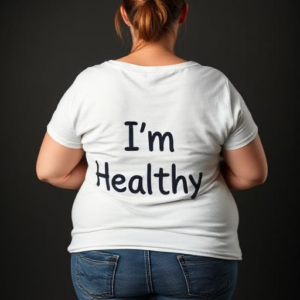A normal blood test in a fat person today is meaningless and not predictive of what their morbid obesity will do to them in the future.
The body positivity and fat acceptance movements have gained significant traction in recent years, with young activists challenging well-established medical facts on health, fitness and body weight.
A common assertion among these influencers – who often call themselves fat activists – is that being even significantly overweight doesn’t necessarily equate to poor health.
Many often point to normal blood tests or the ability to briefly engage in rigorous physical activity (e.g., kicking up a leg high; trotting up a staircase) as indicators of their good health.
Fat liberationists are failing to look at the long-term effects of obesity, even morbid.
“In my experience people who are obese (BMI 30-40) tend to avoid the more serious complications until they get to around 40 years of age,” says Dr. David Beatty, MD, a retired general practitioner with 30+ years of experience and an instructor of general medicine for 20+ years.
“After that I would say that nearly all will begin to get complications of being too heavy.
“Those with severe obesity (BMI over 40) are more likely to get more severe disease at a younger age.
“The younger person has young bones and strong muscles, so they’re better able to carry the extra load.
“Their organs — heart, lungs, liver and kidneys — are usually working well and can take the strain.
“As the years go by there is a natural deterioration in the [human] body and, in many cases, obesity speeds up the decline.”
The Complexity of Health Markers
One key issue in the debate surrounding obesity and health is the oversimplification of what “healthy” means.
Blood tests, such as for cholesterol, blood pressure and glucose, are important tools in evaluating health — but represent only a snapshot of a person’s current condition.
These markers are often used to assess the risk of developing chronic diseases, but they do not fully account for the complex, multifaceted nature of health. And fitness.
For example, some younger and severely overweight influencers and their very heavy followers may have normal blood test results and may not be experiencing immediate complications related to their weight.
Or, due to a sedentary lifestyle, they don’t realize just how quickly overwhelmed they’d physically feel if on a recreational-level hike or helping a friend move.
The normal blood tests are sometimes referred to as metabolically healthy obesity (MHO).
These individuals might have favorable markers like normal cholesterol, blood pressure and insulin response, even though they’re 100 or 150 pounds overweight.
However, the MHO presentation is a temporary condition for many.
You’ll note that the average fat activist who claims normal blood tests is under 40, often 25-30.
Research shows that fat individuals even with MHO are at a higher risk of developing metabolic disorders and cardiovascular diseases as they age.
Stroke, Coronary Heart Disease, Left Ventricular Hypertrophy and Renal Failure
“The first three factors [hypertension, type 2 diabetes and poor cholesterol profile] all combine to increase the risk of these four life threatening conditions,” says Dr. Beatty.
“The damage to the arterial circulation is being done gradually, without causing symptoms throughout the person’s younger years, when they may feel and appear well.
Obese women are four times more likely to have CHD.”
A study in The Lancet Diabetes & Endocrinology (2018) found that obese people who initially have normal metabolic profiles are at a higher risk for developing heart disease, type 2 diabetes and early death as they grow older.
Skeptics or supporters of fat acceptance might argue that anyone, including thin people and professional athletes, are at risk for these conditions as they get older, since all bodies become more vulnerable to illness as they age.
Well yes, this is true, but – for significantly overweight people, the corner that Father Time lurks around is a lot closer than it is for people of medically acceptable body weight – and especially for healthy-weight people who regularly exercise and don’t smoke.
The long-term risks of obesity often remain hidden in youth and are more difficult to identify until later in life, when they may manifest as type 2 diabetes, high blood pressure, severely clogged arteries and worn-down cartilage in the knees.
Many More Conditions Much More Likely
Obesity significantly increases the risk of a variety of health conditions that routine blood tests at the yearly health checkup will not detect — such as obstructive sleep apnea.
“This is much more likely in the severely obese,” says Dr. Beatty, even though OSA has other, unrelated causes (e.g., smoking, nighttime alcohol intake, a large tongue base), which is why thin people can have this condition.
A study in Chest (Javaheri et al., 2014) found that individuals with obesity are at an increased risk of developing OSA; the airway during sleep becomes blocked from excess fat in the throat tissue, leading to interrupted breathing.
Those annual blood tests will also not pick up the higher risks for miscarriage, infertility, gallstones, hiatal hernia, some cancers and deep vein thrombosis (DVT).
“PE is three times more likely with a BMI over 29,” says Dr. Beatty.
A pulmonary embolism (PE) often results from a DVT and can be fatal.
Research published in The Journal of Thrombosis and Haemostasis (Beemath et al., 2018) showed that obesity is a strong independent risk factor for DVT.
According to a study published in Human Reproduction (Pasquali et al., 2014), overweight and obese women face higher rates of both infertility and pregnancy complications.
According to a 2016 review in The Lancet Oncology (Lauby-Secretan et al), obesity is associated with an increased risk of several cancers including breast, colon, uterine and esophageal.
Normal blood tests, then, become akin to a drop of water in an entire bucket.
The Missing Link: Long-Term Health Effects
The long-term health effects of obesity shouldn’t be kicked under the rug by these influencers and their dazed followers.
In a study published in JAMA (2015), researchers followed over 2,000 individuals for up to 40 years and found that those who were obese in their youth were significantly more likely to develop conditions like cardiovascular disease, liver disease and osteoarthritis as they aged, compared to those with a healthy weight.
One important consideration in understanding the long-term effects of obesity is the increased risk of fat distribution.
While someone may have a normal blood test today, it’s important to note that fat is not distributed evenly in the body.
Abdominal fat, in particular, has been linked to a greater risk of cardiovascular problems, even when other blood markers appear normal.
A 2017 review published in The Lancet concluded that visceral fat (fat surrounding the internal organs) is a major contributor to metabolic diseases, even in metabolically healthy obese individuals.
The Scourge of Gravity
Obesity is a big factor in musculoskeletal problems.
Studies have shown that excess body weight accelerates the breakdown of cartilage, which can cause joint degeneration and chronic pain.
A study in Obesity Surgery (2008) found that very heavy people have a significantly higher rate of knee osteoarthritis compared to those of a healthy weight.
“Arthritis progressively affects all of us as the years go by — but it’s more likely to occur earlier in life in the overweight,” says Dr. Beatty.
Just because thin people can get every single one of the aforementioned medical ailments doesn’t exclude obesity from being a major risk factor or a direct causative agent. Reread that.
Why don’t we see older fat activists?

It’s not because fat activism is relatively new. It isn’t. Only its chief conduits – Instagram and TikTok – are relatively new.
But even then, the relative newness of Instagram and TikTok isn’t the reason we don’t see much older fat liberationists.
Instagram and TikTok don’t stop morbidly obese women over 50 from marketing themselves as fat activists.
Is it because morbidly obese women over 50, especially 60, are now dearly paying the price for their weight, and hence aren’t too enthusiastic about “celebrating all body sizes” on social media?
This all isn’t to say there don’t exist fat activists over 50. It’s just that the vast majority of the ones with the biggest followings are under 40.
So what best explains the lack of older fat liberationists?
It’s because the long-term effects of obesity manifest over time, and many activists are too young to begin experiencing them.
Also, they may already be experiencing problems due to such heavy body weight but don’t consciously realize this.
For example, they may be attributing lack of stamina, shortness of breath, back pain, foot pain or acid reflux to mental stress or to what they call “fatphobia.”
There are uncommon exceptions in which a morbidly obese influencer posts about physical ailments — but won’t admit they’re caused by so much excess body weight.
People who’ve lost a considerable amount of weight after being obese for years have posted that they never knew just how lousy they physically felt until they became lighter with improved stamina and mobility.
Obesity can take years or decades to result in visible, debilitating health conditions.
Many who oppose the fat acceptance movement have posted that it’ll be quite interesting to see how many of today’s morbidly obese fat activists with gigantic followings will still be around in 20, even 10 years – and if so, what kind of health and mobility impairments they’ll have.
 Dr. Beatty has worked in primary medicine, surgery, accident and emergency, OBGYN, pediatrics and chronic disease management. He is the Doctor of Medicine for Strong Home Gym.
Dr. Beatty has worked in primary medicine, surgery, accident and emergency, OBGYN, pediatrics and chronic disease management. He is the Doctor of Medicine for Strong Home Gym.
 Lorra Garrick is a former personal trainer certified by the American Council on Exercise. At Bally Total Fitness, where she was also a group fitness instructor, she trained clients of all ages and abilities for fat loss and maintaining it, muscle and strength building, fitness, and improved cardiovascular and overall health.
Lorra Garrick is a former personal trainer certified by the American Council on Exercise. At Bally Total Fitness, where she was also a group fitness instructor, she trained clients of all ages and abilities for fat loss and maintaining it, muscle and strength building, fitness, and improved cardiovascular and overall health.
.










































